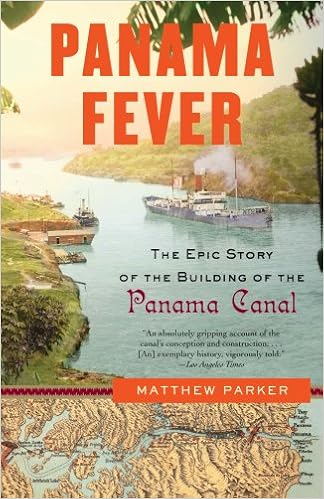Here is the story of the building of the Panama Canal in all its ugliness and glory, mostly, to me, the former. Engineering feats were essential, of course, and what was eventually accomplished amazing--a channel that cuts shipping time across the United States, indeed, across the two oceans, in half. But here too is a story of the same lack of social justice that plagues humankind and that, in my view, is a spot on our own nation's name. The first half of the book recounts the efforts of a French company to build the canal and of its eventual bankruptcy. Thousands of poor French lost their savings in the investment. The son of the main instigator of the canal ended up in jail, a scapegoat, the one on whom revenge was reaped, though the family itself lost all its own money in the company's eventual downfall (a warning perhaps to those of us who would too quickly throw stones at executives whose companies fall apart under their stewardship--it's not always criminal wrongdoing but simple bad economics).
Enter the Americans. Sure, the French man who pushed the project ended up in jail and got nothing out of the canal, but some other French cronies would work up a deal whereby they would sell the canal to the American nation and thus recoup their losses (meanwhile, most of the original small-time investors were shut out). Never mind that the Americans for years had favored a canal through Nicaragua--these French executives would lobby hard and eventually win.
One major problem would be the nation of Colombia, which Roosevelt would take care of by helping the Panamanians, who never had been totally happy as part of Colombia, to rebel and set up their own nation, and then, who he would subsequently betray by hastily signing--with a French man representing Panama during its transition to its new government--a treaty that essentially divested Panama of control of the canal and the zone around it. After Roosevelt defended his actions to Congress, one congressman said congently, "You have shown that you were accused of seduction and you have conclusively proved that you were guilty of rape." Ten years of building the canal would subsequently consist of employing black Caribbeans at next-to-nothing wages to dig the huge trench while white American overseers worked higher-wage supervisory jobs, no matter the degree of experience of either. The canal, on this level, simply leaves me disgusted. A great and useful feat, to be sure--but can ends ever justify means?
As a book, Parker's portrait is a great summary of the events and a well-told story, though it left me a bit cold. I'm not sure why. Perhaps, it is my disgust with much of what happened. Perhaps also, even given its great attention to the little guys doing the work, I didn't feel like I got a deep sense of the personal psychology behind some of the big actors or of the regular folks themselves. Hard to say why I felt this way; still, I would definitely recommend it to someone looking for a basic history of the canal's building.
Sunday, January 25, 2009
On "Panama Fever" by Matthew Parker ***
Labels:
Books,
Matthew Parker,
Nonfiction,
Three-Star Nonfiction
Subscribe to:
Post Comments (Atom)







No comments:
Post a Comment